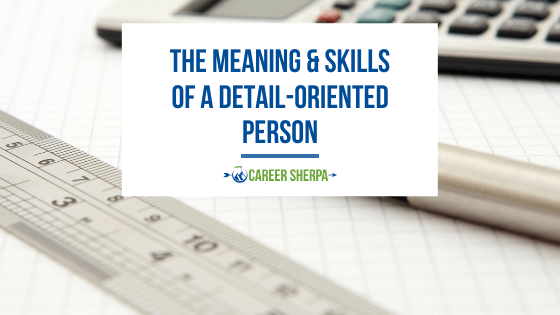Being a detail-oriented person has many benefits, and one of them is that employers find you more desirable. In fact, some job posts specifically ask for detail-oriented individuals.
But what exactly does that mean?

This guide will teach you everything you need to know about being detail-oriented, and how you can develop these skills to benefit your career.
Detail-Oriented Definition
It’s all in the details!
Being detail-oriented means that you pay close attention to all the specifics in a job or task. Rather than simply trying to get things done or only focusing on the big picture, you hone in on the precise details to ensure that everything is done correctly. A detail-oriented person isn’t happy just doing the bare minimum.
They actively avoid turning in sloppy work, reviewing all the particulars before completing a project. Typically, they follow a more systematic approach than other people when it comes to their work.
As a result, detail-oriented minds can spot errors and ensure that everything is done correctly.
Why Being Detail-Oriented is Helpful
There’s no denying that being detail-oriented is a huge plus in any field. But let s explore what makes this trait so desirable to employers.
Put yourself in the shoes of a business owner or manager for a second. Would you rather hire someone whose work you needed to review thoroughly and correct often, or would you rather go with someone who gives you high-quality work that you can trust?
You’d be hard-pressed to find an employer who chooses to go with the former!
Employers need people they can trust. No one wants to micromanage their employees or redo work because of continual errors.
Those in higher positions need to turn their attention to the bigger picture, and they can’t do that when they have to put energy into fixing mistakes or hover over employees as they work.
They need someone they can depend on no matter what. Every employee within a company is working towards a bigger goal, and minor issues are expected. But employers want high-quality work each time.
It s a waste of time and money if they need to go back for corrections.
Detail-oriented people pay attention and strive to do work that’s immaculate.
That precision and quality go a long way to support an organization’s bottom line.
Habits & Skills of a Detail-Oriented Person
Being precise with your work is easier said than done. If you want to become a detail-oriented person, you have to develop certain skills (and turn them into habits).
1. All-Day Productivity
One of the reasons detail-oriented people are so good at their job is that they limit distractions. Instead of putting things off or finding ways to waste time, they’re eager to get to work and complete their daily duties. You’ll find that detail-oriented workers have excellent time management skills and a strong work ethic.
Even when there’s “nothing to do,” most detail-oriented workers will use that time wisely to review the work or get a head start on the next project.
2. Remembering Small Details
Ever meet someone who can remember everyone’s names and birthdays? Or maybe they have a knack for recalling details from a project they worked on months ago. There’s a good chance that they are detail-oriented.
Remembering the little things is what makes detail-oriented people who they are. Whether it’s instructions for the task they’re working on or important dates on the calendar, those facts are always in the back of their head!
3. Strong Organizational Skills
Impeccable organization skills are a must for those who are detail-oriented. Time management and delegation are keys to success in any work environment. You must be efficient and figure out how to complete projects within the timeframe you have.
A detail-oriented person often relies on schedules and task lists to stay organized. They use them to ensure that they have enough time and energy to get work done to their high standards before the deadline.
4. Spotting Mistakes
Having the ability to identify errors is an important skill for detail-oriented people. It’s easy to gloss over mistakes when working on a project that requires great focus and precision.
But that’s not how detail-oriented people approach their work. They aim to spot issues and address them before they become a problem later. In most cases, they’re the first to find problems in a group setting and will often be the ones to come up with an effective solution.
5. Consistent Review
Not only can a detail-oriented person spot issues on the fly, but they often spend time double-checking their work to find problems they missed. Proofreading and review are some of their strongest habits.
For the detail-oriented, this can come naturally or be learned over time. Most won’t feel comfortable letting their work go to the next stage without giving it a final once-over.
6. Following a Routine
We’ve already talked about the importance of time management, and having a routine can help with this. For a detail-oriented person, a structured day is crucial. They thrive when they ve established a routine that allows them to be productive and organized.
For example, they might take lunch breaks at the same hour every day. Even at home, they’ll have a consistent routine of going to bed and waking up at a specific time. This consistency contributes to their success at work as well as their ability to live a happy and healthy life outside of the office.
7. Timeliness
It’s rare for a detail-oriented person to be even a few minutes late to an event. Their organizational skills apply to their schedule as well, which means they aren t taken by surprise by a meeting or appointment.
8. Preparedness
This habit goes along with the last one. A detail-oriented person aims to be prepared no matter what their obligations are in the workplace. They’ve done their homework and come into meetings ready to contribute and push things forward.
Those who are detail-oriented know that it s always better to be over-prepared than underprepared.
9. Curiosity
Finally, detail-oriented people are curious. They like to learn and will often go out of their way to absorb new facts. This is especially true with information regarding a project or work assignment.
Don’t be surprised if you see a detail-oriented person asking numerous questions. They want to get things right the first time, and fact-gathering is just a part of that process. Even after they start, they may look into other ways to do their work until they find the most efficient method possible.
How to Become More Detail-Oriented
If being a detail-oriented person doesn t come naturally to you, don’t worry. While some people are born with many of these traits, there are ways that you can learn them. In time you can train yourself to develop detail-oriented skills, creating a positive change in your life.
Here are some tips to get you started.
1. Work on Your Physical and Mental Health
The first step is to take care of yourself. That might not seem like it has much to do with your ability to be detail-oriented, but you’d be surprised by the impact your physical and mental state have on your work life.
When you are unwell in any way, distractions are constant. Your mind can wander, and your concentration can wane significantly. This is a recipe for disaster if you re trying to focus on the little things. Work on yourself, and the rest will fall into place!
Consider setting some time aside for meditation and exercise. Physical exercise before and after work is a great way to get the juices flowing. Some even say it improves memory and concentration!
2. Organize Your Life
The best way to build detail-oriented skills is to stay organized. Get in the habit of creating lists of things you must do for each task or project you undertake.
You can also use visuals to your advantage by laying everything out in front of you. Doing so can help you prioritize tasks and ensure that nothing gets skipped.
Try getting more organized outside of work as well if you truly want to build these habits. You can make to-do lists for cleaning your house, shopping for groceries, and more. Once you get into the flow of things, these skills will become second nature.
There are tons of organizational tools and approaches available to you, so experiment until you find the method that works for you.
3. Establish a Routine
Creating a routine and sticking to it can make a world of difference if you want to become a detail-oriented person. We’re not just talking about scheduling and organizing your work here. Your routine should encompass other parts of your life as well.
Try to establish a consistent time that you wake up and go to bed. Then, form a habit of working out or eating breakfast. The routine will not only improve your health, but it will also get you in the habit of systematically working through tasks on a daily basis.
4. Break Down Your Projects
This is where you ll start building detail-oriented skills for the workplace, and it s all in the approach. Whenever you have a task or project at work that needs to be accomplished, start by breaking it down into small pieces.
Doing this will allow you to identify the details and sub-tasks that each project contains. This will prevent you from skipping anything important and ensuring that you re doing high-quality work.
5. Track Everything
If you want to become a detail-oriented person at work, tracking everything needs to become a habit. Work you ve completed, what remains to be done, files and documents you ve received, everything.
If you re not tracking the details, you ll never know if you missed anything. Detail-oriented people don t rely on their memory. They write things down and review them later.
6. Double-Check Your Work
Whenever you re working on a project or task at work, always make sure to double-check everything before you turn it in. When you combine this habit with your dedication to tracking what has been done, you ll be able to produce high-quality work all the time.
You should feel uncomfortable at the idea of passing along your work without giving it one more look. Be your harshest critic when it comes to quality, and good things will follow.
7. Work on Tuning Out Distractions
These days, we’re surrounded by distractions. You likely have plenty of them surrounding you at this very moment!
Learn to tune those things out (especially when you re working). Turn off your notifications on your phone, put yourself in a silent place for effortless concentration, and minimize the noise that pulls focus.
It can take some getting used to, but learning to avoid distractions when necessary can make a noticeable difference in your productivity levels and help you become more detail-oriented.
8. Less Multi-Tasking and More Focus
If your work requires you to perform multiple tasks, try not to do them at the same time. Even entering data and talking with someone can result in careless mistakes.
Focus on completing a single task before starting another and you ll likely notice fewer errors and that you complete things faster.
Great Ways to Show That You’re Detail-Oriented
Employers are always looking for detail-oriented people to add to their teams, and job-seekers know that. As a result, applicants often flood their resumes with the phrase “detail-oriented” and its many synonyms.
While there’s nothing wrong with doing that, you have to do more to stand out.
One of the best ways to show that you’re detail-oriented is by having an impeccable resume and cover letter.
How awful would it be to say that you pride yourself on your ability to focus on the finer details of a job while submitting a resume rife with spelling and grammatical errors? Most HR reps and hiring managers would give your resume a good laugh and reject it immediately!
Take time to proofread. Once you ve proofread it, do so again. Then, give it to someone else to look over!
You can never be too careful when it comes to spelling, grammar, and even formatting errors. The goal is to impress, and having an error-free resume is the first way to show that you are indeed detail-oriented.
Inside your application and resume, you can show a detail-oriented mindset by giving real-world examples. Use some of your past experiences to highlight instances where your attention to detail helped you succeed. All jobs require precision at some point.
Furthermore, use precise words to support the point you’re trying to make.
Say, for example, that you previously worked in an office setting. You could highlight when you had to organize pivotal presentations, sift through spreadsheets to manage data, or craft individual customer-facing emails. Those tasks and others all require attention to detail.
The Benefit of Mentioning That You’re Detail-Oriented on a Resume
Touching on your detail-oriented nature in a resume can be beneficial in the long run. Whether it’s a brief mention or a detailed highlight like we mentioned earlier, being detail-oriented tells potential employers many things.
It indicates that you take pride in the details and are willing to put in the work to do things correctly.
Not only that, but it shows that you are attentive enough to complete your job efficiently and accurately. That means less time wasted on fixing errors or redoing tasks.
Finally, it shows that you’re organized and know how to manage your time. No employer wants to hound their team to get work done constantly. When you say you’re detail-oriented, it indicates that you are self-sufficient and reliable.
Employers must focus their attention on big-picture items. Having detail-oriented workers saves them time and money, as they know they can complete projects correctly and on time.
Conclusion
The meaning of being detail-oriented can vary a bit depending on who you ask. But at the end of the day, it s all about being organized and not missing the little things.
Now that you know the best ways to develop these habits and showcase them to employers, there s nothing stopping you! Be patient, learn the skills, and showcase them during your next job search.
The post The Meaning & Skills Of A Detail-Oriented Person appeared first on Career Sherpa.
Source














